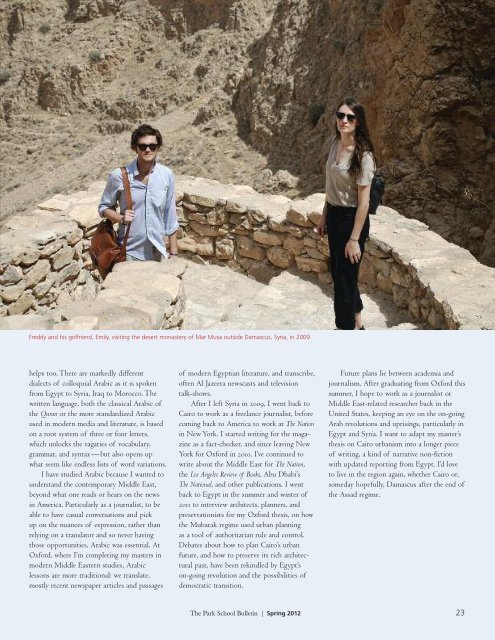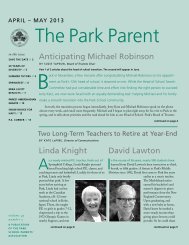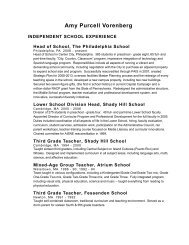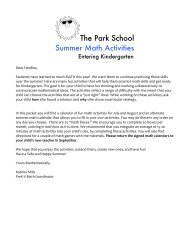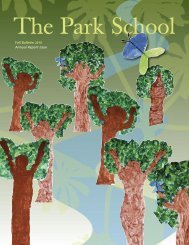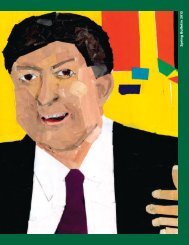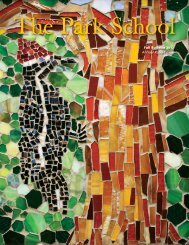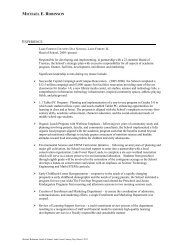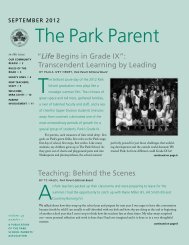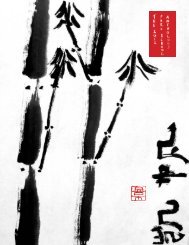Spring Bulletin 2012 - The Park School
Spring Bulletin 2012 - The Park School
Spring Bulletin 2012 - The Park School
You also want an ePaper? Increase the reach of your titles
YUMPU automatically turns print PDFs into web optimized ePapers that Google loves.
Freddy and his girlfriend, Emily, visiting the desert monastery of Mar Musa outside Damascus, Syria, in 2009.<br />
helps too. <strong>The</strong>re are markedly different<br />
dialects of colloquial Arabic as it is spoken<br />
from Egypt to Syria, Iraq to Morocco. <strong>The</strong><br />
written language, both the classical Arabic of<br />
the Quran or the more standardized Arabic<br />
used in modern media and literature, is based<br />
on a root system of three or four letters,<br />
which unlocks the vagaries of vocabulary,<br />
grammar, and syntax — but also opens up<br />
what seem like endless lists of word variations.<br />
I have studied Arabic because I wanted to<br />
understand the contemporary Middle East,<br />
beyond what one reads or hears on the news<br />
in America. Particularly as a journalist, to be<br />
able to have casual conversations and pick<br />
up on the nuances of expression, rather than<br />
relying on a translator and so never having<br />
those opportunities, Arabic was essential. At<br />
Oxford, where I’m completing my masters in<br />
modern Middle Eastern studies, Arabic<br />
lessons are more traditional: we translate,<br />
mostly recent newspaper articles and passages<br />
of modern Egyptian literature, and transcribe,<br />
often Al Jazeera newscasts and television<br />
talk-shows.<br />
After I left Syria in 2009, I went back to<br />
Cairo to work as a freelance journalist, before<br />
coming back to America to work at <strong>The</strong> Nation<br />
in New York. I started writing for the magazine<br />
as a fact-checker, and since leaving New<br />
York for Oxford in 2010, I’ve continued to<br />
write about the Middle East for <strong>The</strong> Nation,<br />
the Los Angeles Review of Books, Abu Dhabi’s<br />
<strong>The</strong> National, and other publications. I went<br />
back to Egypt in the summer and winter of<br />
2011 to interview architects, planners, and<br />
preservationists for my Oxford thesis, on how<br />
the Mubarak regime used urban planning<br />
as a tool of authoritarian rule and control.<br />
Debates about how to plan Cairo’s urban<br />
future, and how to preserve its rich architectural<br />
past, have been rekindled by Egypt’s<br />
on-going revolution and the possibilities of<br />
democratic transition.<br />
Future plans lie between academia and<br />
journalism. After graduating from Oxford this<br />
summer, I hope to work as a journalist or<br />
Middle East-related researcher back in the<br />
United States, keeping an eye on the on-going<br />
Arab revolutions and uprisings, particularly in<br />
Egypt and Syria. I want to adapt my master’s<br />
thesis on Cairo urbanism into a longer piece<br />
of writing, a kind of narrative non-fiction<br />
with updated reporting from Egypt. I’d love<br />
to live in the region again, whether Cairo or,<br />
someday hopefully, Damascus after the end of<br />
the Assad regime.<br />
<strong>The</strong> <strong>Park</strong> <strong>School</strong> <strong>Bulletin</strong> | <strong>Spring</strong> <strong>2012</strong> 23


